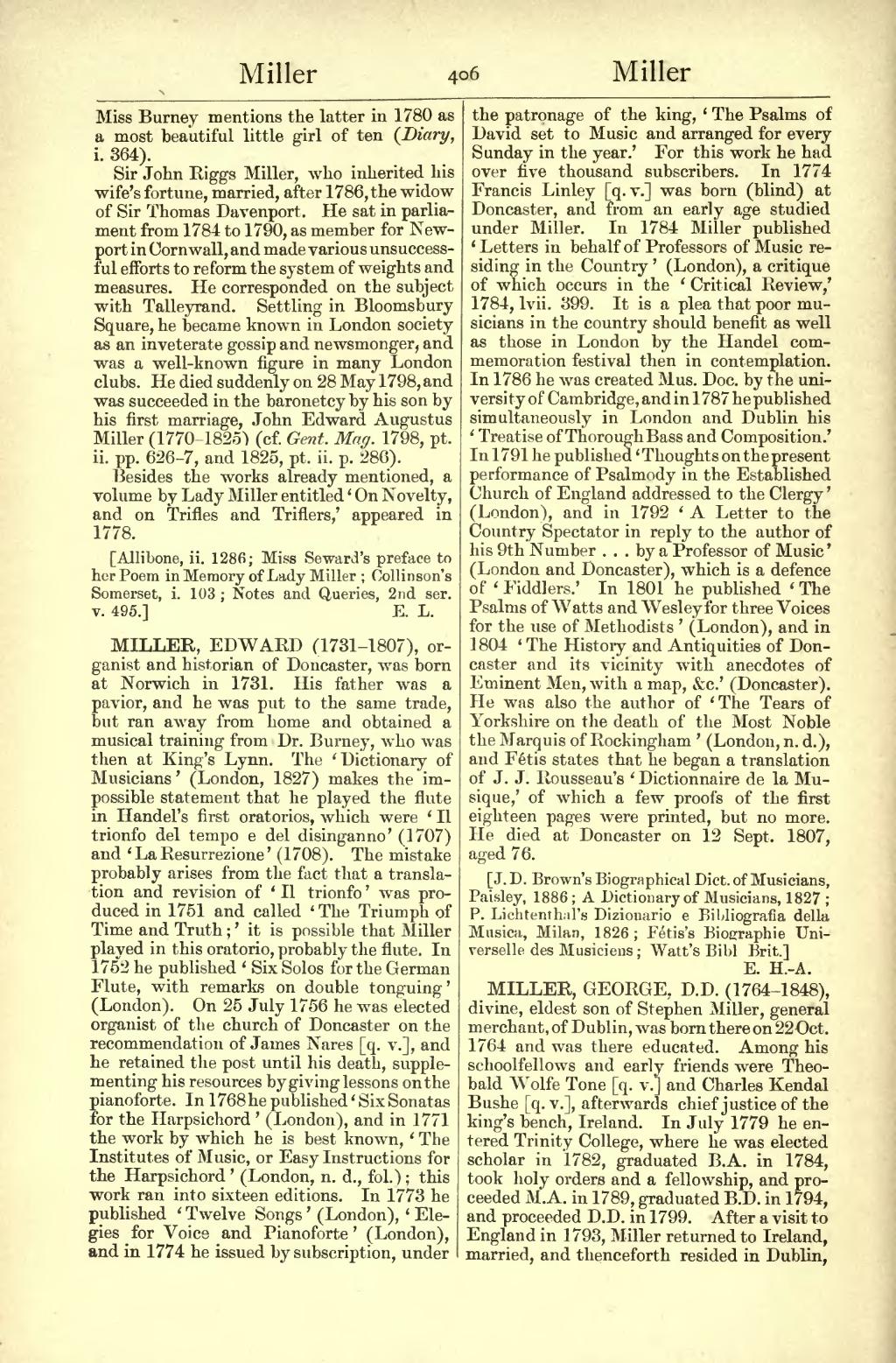Miss Burney mentions the latter in 1780 as a most beautiful little girl of ten (Diary, i. 364).
Sir John Riggs Miller, who inherited his wife's fortune, married, after 1786, the widow of Sir Thomas Davenport. He sat in parliament from 1784 to 1790, as member for Newport in Cornwall, and made various unsuccessful efforts to reform the system of weights and measures. He corresponded on the subject with Talleyrand. Settling in Bloomsbury Square, he became known in London society as an inveterate gossip and newsmonger, and was a well-known figure in many London clubs. He died suddenly on 28 May 1798, and was succeeded in the baronetcy by his son by his first marriage, John Edward Augustus Miller (1770–1825) (cf. Gent. Mag. 1798, pt. ii. pp. 626–7, and 1825, pt. ii. p. 286).
Besides the works already mentioned, a volume by Lady Miller entitled ‘On Novelty, and on Trifles and Triflers,’ appeared in 1778.
[Allibone, ii. 1286; Miss Seward's preface to her Poem in Memory of Lady Miller; Collinson's Somerset, i. 103; Notes and Queries, 2nd ser. v. 495.]
MILLER, EDWARD (1731–1807), organist and historian of Doncaster, was born at Norwich in 1731. His father was a pavior, and he was put to the same trade, but ran away from home and obtained a musical training from Dr. Burney, who was then at King's Lynn. The 'Dictionary of Musicians' (London, 1827) makes the impossible statement that he played the flute in Handel's first oratorios, which were 'Il trionfo del tempo e del disinganno' (1707) and 'La Resurrezione' (1708). The mistake probably arises from the fact that a translation and revision of 'II trionfo' was produced in 1751 and called 'The Triumph of Time and Truth;' it is possible that Miller played in this oratorio, probably the flute. In 1752 he published 'Six Solos for the German Flute, with remarks on double tonguing' (London). On 25 July 1756 he was elected organist of the church of Doncaster on the recommendation of James Nares [q. v.], and he retained the post until his death, supplementing his resources by giving lessons on the pianoforte. In 1768 he published 'Six Sonatas for the Harpsichord' (London), and in 1771 the work by which he is best known, 'The Institutes of Music, or Easy Instructions for the Harpsichord' (London, n. d., fol.) ; this work ran into sixteen editions. In 1773 he published 'Twelve Songs ' (London), 'Elegies for Voice and Pianoforte' (London), and in 1774 he issued by subscription, under the patronage of the king, 'The Psalms of David set to Music and arranged for every Sunday in the year.' For this work he had over five thousand subscribers. In 1774 Francis Linley [q. v.] was born (blind) at Doncaster, and from an early age studied under Miller. In 1784 Miller published 'Letters in behalf of Professors of Music residing in the Country' (London), a critique of which occurs in the 'Critical Review,' 1784, Ivii. 399. It is a plea that poor musicians in the country should benefit as well as those in London by the Handel commemoration festival then in contemplation. In 1786 he was created Mus. Doc. by the university of Cambridge, and in 1787 he published simultaneously in London and Dublin his 'Treatise of Thorough Bass and Composition.' In 1791 he published 'Thoughts on the present performance of Psalmody in the Established Church of England addressed to the Clergy' (London), and in 1792 'A Letter to the Country Spectator in reply to the author of his 9th Number ... by a Professor of Music' (London and Doncaster), which is a defence of 'Fiddlers.' In 1801 he published 'The Psalms of Watts and Wesley for three Voices for the use of Methodists' (London), and in 1804 The History and Antiquities of Doncaster and its vicinity with anecdotes of Eminent Men, with a map, &c.' (Doncaster). He was also the author of 'The Tears of Yorkshire on the death of the Most Noble the Marquis of Rockingham' (London, n. d.), and Fetis states that he began a translation of J. J. Rousseau's ' Dictionnaire de la Musique,' of which a few proofs of the first eighteen pages were printed, but no more. He died at Doncaster on 12 Sept. 1807, aged 76.
[J. D. Brown's Biographical Diet, of Musicians, Paisley, 1886; A Dictionary of Musicians, 1827; P. Lichtenthal'a Dizionario e Bibliografia della Musica, Milan, 1826; Fetis's Biographie Universelle des Musiciens ; Watt's Bibl Brit.]
MILLER, GEORGE, D.D. (1764–1848), divine, eldest son of Stephen Miller, general merchant, of Dublin, was born there on 22 Oct. 1764 and was there educated. Among his schoolfellows and early friends were Theobald Wolfe Tone [q. v.] and Charles Kendal Bushe [q. v.], afterwards chief justice of the king's bench, Ireland. In July 1779 he entered Trinity College, where he was elected scholar in 1782, graduated B.A. in 1784, took holy orders and a fellowship, and proceeded M. A. in 1789, graduated B.D. in 1794, and proceeded D.D. in 1799. After a visit to England in 1793, Miller returned to Ireland, married, and thenceforth resided in Dublin,
